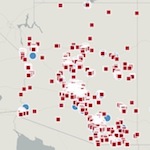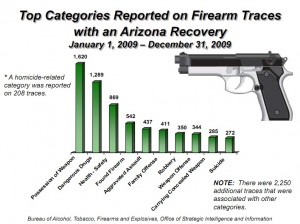 The map below shows every federally licensed firearm dealer in the state of Arizona, along with every state-licensed inpatient mental healthcare provider.
The map below shows every federally licensed firearm dealer in the state of Arizona, along with every state-licensed inpatient mental healthcare provider.
What it reveals may be no surprise: In Arizona, gun shops outnumber mental health clinics four to one.
Why am I picking on Arizona? It’s not just because I used to live in New Mexico, whose residents tend to consider themselves superior to their immediate neighbors. It’s because Arizona is the source of the small arms used in violent crimes across the region and, notably, the scene of a shooting massacre by an apparently untreated paranoiac who easily obtained a firearm.
 Publicly available trace data by the US Bureau of Alcohol, Tobacco, Firearms and Explosives shows that, in 2009, most of the crimes associated with firearms from Arizona related to violations of gun-control or drug laws. A smaller share of those crimes were more serious aggravated assaults, as well as “family offenses”—a euphemism for some of the most commonplace and terrifying violent crimes in America.
Publicly available trace data by the US Bureau of Alcohol, Tobacco, Firearms and Explosives shows that, in 2009, most of the crimes associated with firearms from Arizona related to violations of gun-control or drug laws. A smaller share of those crimes were more serious aggravated assaults, as well as “family offenses”—a euphemism for some of the most commonplace and terrifying violent crimes in America.
What these official figures don’t show is a wave of violence across the border. A recent Washington Post investigation identified Arizona as a leading exporter of illegal weaponry to violent Mexican drug cartels.
Since the massacre last month in Tuscon, in which 19 people were shot and six died, including a federal judge and a nine-year-old girl, attention has focused on the untreated mental health problems of the shooter, Jared Loughner. Whether or not better psychiatric care or tighter gun laws could’ve prevented Loughner’s crime, the map below makes one thing clear:
If you want to check yourself in to a mental hospital in Arizona, you may have to travel hundreds of miles and just to wait in a long line. But if you want to solve your problems with a bullet, there are opportunities around every corner.
Arizona gun dealers versus inpatient behavioral health providers
Open a larger version of this map in a new browser window.
I should make a few notes on the data, which comes from the ATF and the Arizona Department of Health Services. The ATF firearms dealers’ list is the most recent available, current as of October 2010. Interestingly, for all the fuss gun aficionados made recently over the rules around antique military rifles, not a single Arizonan gun shop is licensed exclusively as a “curio or relic” dealer. This is further evidence that certain arguments put forward by the National Rifle Association are, to put it nicely, bogus.
As for the mental health data: I excluded approximately 550 outpatient providers from the map, because they skew the numbers in a misleading direction. Most outpatient clinics provide services that are limited in nature—family therapy, religious counseling or drug and alcohol treatment. In other words, they’re the kind of places that offer court-ordered safety classes for drunk drivers. When it comes to serious mental illnesses like those apparently afflicting Loughner, most experts agree that some form of long-term inpatient treatment is required.
Even when all the unrelated outpatient clinics (like “Promesa DUI Services” and “Alcohol Recovery Solutions”) are included, Arizona still has more gun dealers than “behavioral health” providers: 953 to 1,564, respectively, a ratio of roughly three to five.
I should also note that of the inpatient providers included in the map, roughly two-thirds have a capacity of fewer than 10 beds. Only 32 providers have a capacity of 50 beds or more.
In total, the inpatient providers have a combined capacity of 6,851. This is in a state with 6.6 million people, approximately six percent of whom—396,000 people—may have a serious mental illness.
There are 1,564 gun dealers and 396 inpatient behavioral health providers in Arizona.